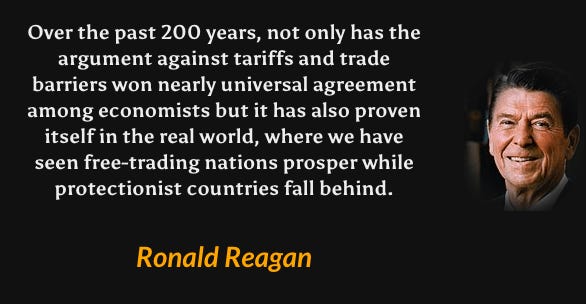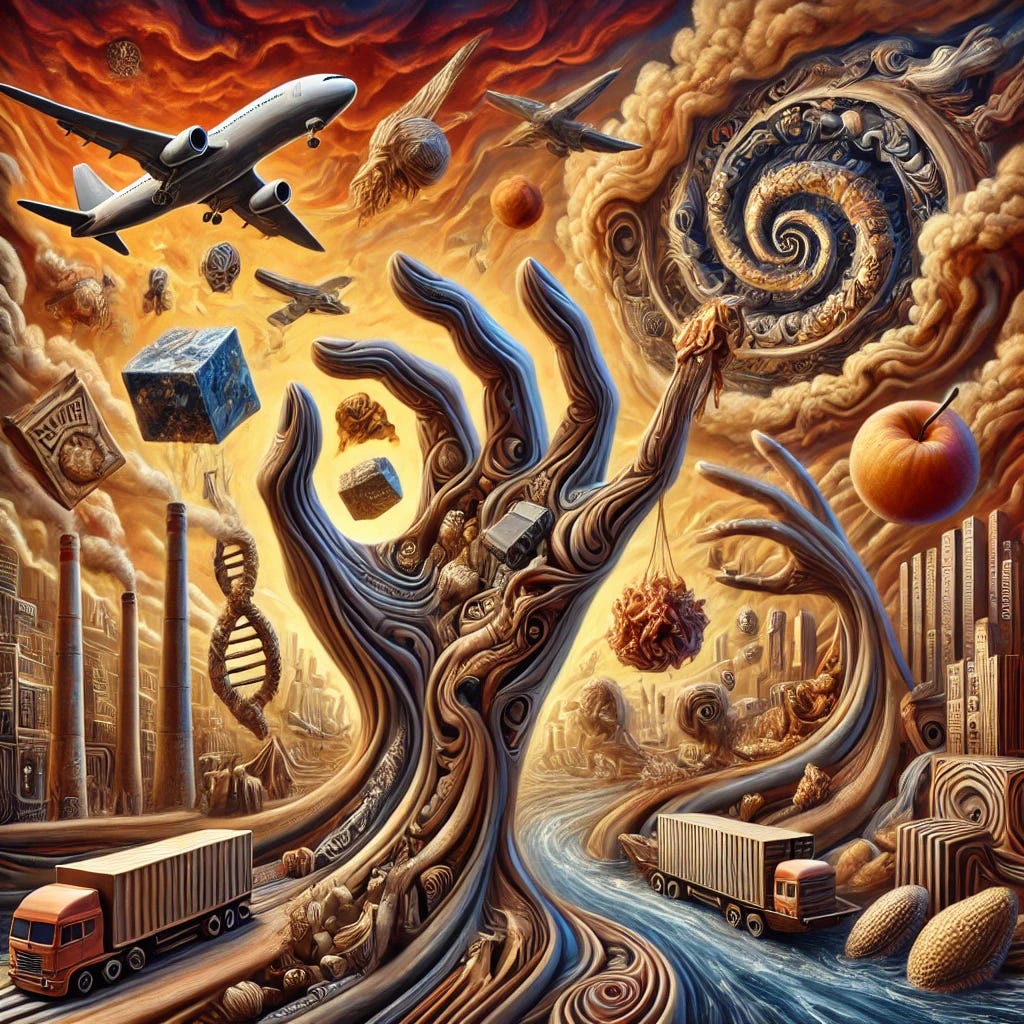Tariffs Through Time: Rome’s Fall, Reagan’s Vision, and Today’s Mistakes
Breaking it down: How Tariffs Drive Inflation and Disrupt Commodity Markets. Part 1 (Let me know if you want a part 2)
Tariffs and the Lessons of History
A simple idea sums up my view of government: Centralization is bad (any form of government control). Decentralization is good.
This isn’t about emotion, it’s about history. Just like trading, I look at the patterns of the past to understand the present.
Did you know that Republicans were the champions of free trade.
What can we learn from the Roman Empire, which imposed tariffs in its final days of dominance?
The answers lie in the unseen consequences of tariffs and the lessons history keeps trying to teach us. Let’s dive in.
Tariffs: What You Need to Know
What Are Tariffs?
Tariffs are taxes on imports, designed to:
Make foreign goods more expensive (protecting domestic industries).
Raise government revenue.
Influence trade policies.
There are two types:
Specific tariffs: Fixed fees (e.g., $100 per ton of steel).
Ad valorem tariffs: A percentage of the product’s value (e.g., 10% on electronics).
How They Work
Importers pay tariffs at the border, raising costs. These costs often get passed to consumers as higher prices, though competition sometimes prevents that.
The Impacts
Higher Consumer Costs: Import prices go up, meaning you pay more.
Protection for Domestic Producers: Local businesses get a break, but at the expense of consumers and efficiency.
Trade Wars: Retaliation from other countries can escalate, hurting global trade and economic growth.
The Hidden Problem: What’s not seen? The jobs and industries lost because money gets redirected into the “protected” industry. This economic distortion reduces overall efficiency.
History Speaks
The Roman Empire’s Collapse
Tariffs and excessive trade restrictions contributed to the decline of the Roman Empire. As the empire expanded, it relied heavily on trade for food, raw materials, and luxury goods to sustain its sprawling territories. However, rising tariffs and taxes on imports disrupted the flow of goods.
Economic Strain on Citizens: High import duties made essential goods—like grain and textiles—more expensive for ordinary Romans. This led to unrest as people struggled to afford necessities.
Stifled Trade Routes: Tariffs discouraged merchants from trading with Rome, reducing the availability of foreign goods. Over time, key trade routes became less profitable, weakening economic links that once bolstered the empire.
Local Inefficiency: To avoid tariffs, Rome tried to boost domestic production, but the local economy couldn’t match the efficiency of their trading partners. The result? Scarcity, inflated prices, and a sluggish economy.
Weakened Military: With dwindling revenue from trade, Rome couldn’t fund its vast military machine effectively, leaving its borders vulnerable to invasions.
The Roman experience is a powerful warning: restricting trade doesn’t build strength; it erodes the foundations of an economy.
A Shift in Republican Thinking
Historically, many Republicans opposed tariffs, championing free trade as a cornerstone of economic policy.
Ronald Reagan: Reagan believed in free markets and reducing barriers to global trade. He called for lower or no tariffs and led efforts to promote international economic cooperation, famously stating, “Protectionism is destructionism.”
George H.W. Bush: Bush continued this legacy, pushing for the North American Free Trade Agreement (NAFTA), which aimed to eliminate most tariffs between the U.S., Canada, and Mexico.
George W. Bush: Even when Bush briefly imposed steel tariffs in 2002, he rolled them back within two years after economic backlash and fears of retaliation.
Instead of promoting open markets, recent policies have leaned into protectionism, raising costs for consumers and straining international relationships.
This shift begs the question: Are tariffs really protecting American workers, or are they abandoning the free-market principles that once defined conservative economic thinking?
Smoot-Hawley (1930):
Fast forward to modern times, and the same mistakes persist:
Raised prices.
Crushed exports as countries retaliated.
Deepened the Great Depression.
Why Economists Hate Tariffs
Tariffs distort markets. They:
Misallocate resources by inflating prices artificially.
Force consumers to subsidize inefficiency.
Comparative Advantage explains why free trade works: Countries do what they’re best at, trade what they’re not, and both win. Tariffs mess with this, pushing resources into inefficient industries.
The Seen and Unseen
Economist Frédéric Bastiat nailed it:
“What is seen is the protected industry’s profits. What is not seen are the lost jobs, higher costs, and opportunities that vanish.”
Tariffs in the recent past.
Trump’s 25% tariff on steel and 10% on aluminum? It sounds tough but does more harm than good:
Higher costs for American manufacturers relying on steel and aluminum.
Fewer jobs in those industries.
Trump said, “Trade wars are good and easy to win.” But history says otherwise. Tariffs don’t fix trade deficits, they hurt working Americans and global relationships.
The Way Forward
The answer isn’t new. It’s old:
Free trade works.
Tariffs don’t.
When we forget history, whether Rome or Smoot-Hawley, we repeat it. Tariffs might sound bold, but they’re just expensive failures dressed up as solutions.
Focus on what works: Just like people markets thrive when they’re free.
Against All Odds Research
Stay Connected:
YouTube: Against All Odds Research Channel (@againstalloddsresearch)
Twitter: Jason P (@jasonp138)
Substack: AAO Research
Support the Bees: Help save the native bees! Learn more and get involved here.




Yeah that's a fun one. Brexit hasn't exactly helped the UK economy by tearing up free trade with its nearest neighbours as far as I can see. Won't tariffs on Canadian lumber send US home construction costs higher? Not sure Canada will want those long distance trucked Californian peaches any more either. But the big US owned supermarkets will insist I suppose. It seems the US owns basically everything in Canada anyway. I'm wondering if the plan to boost US oil production by 25% is supposed to tamp down the rampant inflation of tariffs or what but it all sounds bonkers. Strong dollar pay down debt is the plan right? I have a feeling there might be a big old Liz Truss moment if any of this comes to pass.
ha well I hadn't really updated myself on Canadian lumber tariffs in a while but lol... https://www.nahb.org/blog/2024/08/canadian-lumber-tariffs